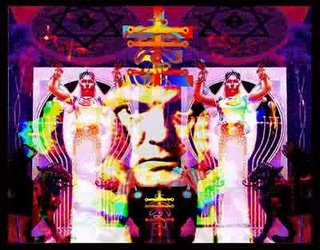
When someone takes “Great Beast 666” as a moniker, it’s guaranteed to get a reaction, especially in the repressive climate of post-Victorian England. As anyone with even a passing acquaintance with mass media knows, nothing galvanizes the attention of the tabloid jackals more than a whiff of notoriety, and Crowley went out of his way to create fodder for the Fleet Street attack-pack of the day.
The average person with a dull and fairly uneventful life, is fascinated by tales of excess. It’s the same instinct that draws people to car crashes. They are fixated by damage. I guarantee you, that many of your so-called friends will find you infinitely more fascinating if rumor and innuendo turn you into a public spectacle. Of course they may not return your calls, but that’s another matter. People revel in scandal, damage and rumor, even as they deny that they are influenced by it.
So not unnaturally, judgments about Aleister Crowley that are centered on his personality traits, excesses and political “betrayals” are taken by his detractors to be the measure of the man. Such people tend to be satisfied with verdicts based on the most obvious lapses from status quo behavior. James Joyce was also their target. He was lambasted as a drunk, purveyor of the obscene, whore monger and traitor-to-Ireland by the righteous, even as he penned the greatest novel in modern English literature - Ulysses.
People who venerate Crowley and view him as a demi-god hold just as an unbalanced view of the man as the detractors who call him the devil incarnate. Both of these points-of-view overlook the truth in their rush to extremes.
In the past when I was affiliated with groups that were influenced by Crowley's ideas, I found that the people who identified most closely with The Beast, tended to be the most unbalanced. Some had an unresolved father complex, and viewed Al as the spiritual father they never had. Others felt inadequate on some level and derived a symbiotic feeling of empowerment from identifying with The Beast. When identification with Crowley becomes a crutch, it amounts to little more than a cult of personality and is entirely unhelpful within the context of constructive magickal work.
Even though I hold Crowley in high esteem and value his unique contribution to modern magick, I also take a realistic view when it comes to an appraisal of the man himself.
He was born in post-Victorian England; the son of Plymouth Brethren parents who practiced a narrow, fundamentalist form of Christianity with emphasis on fire and brimstone. At boarding school he was the target of bullies and became dangerously ill as a consequence of extreme abuse. At Cambridge, he did his own thing and developed a strong interest in metaphysics and mountaineering. The latter turned the bullied child into a tough and resourceful daredevil who scaled some of the highest peaks in the world, in the process setting records and making a name for himself.
When he joined the Golden Dawn, his magical training began in earnest. Even in company with the like-minded he succeeded in creating waves. He viewed most of the probationers of the G:D as average mediocrities and supplemented his work in the Order with magical experimentation of his own. He was an original in the purest sense of the term. It was the same instinct that compelled him to press into areas where others hesitated to go. The peaks of mountains were but metaphors for the realms of knowledge he would conquer by dint of extraordinary pluck and brilliance.
Joyce managed to write the greatest novel of modern literature while drinking himself penniless and cheating on his wife with whores. Likewise Crowley, despite his many shortcomings, succeeded in raising the banner of Thelema and creating a body of work that arguably helped to initiate the modern occult revival, while engaging in conduct that shocked polite society.
We all have flaws and imperfections, it's just that some people are better at hiding them than others. I was interested to read an Indian guru who asserted that even the experience of Samadhi cannot remove our inner neurosis. Heightened states of consciousness may on the contrary even magnify negative traits, rather than diminish them.
Aleister Crowley was at root a man who was wounded by his upbringing and by the cruelty he experienced at a young age. That he had the guts to fight against the negative forces arraigned against him is testament to his character. If in the course of this fight to discover his star and his destiny, he engaged in behavior judged "unacceptable" by the hypocrites who make up the bulk of society, so be it. Their judgment cannot take away one iota from his real achievements.
In the case of legendary figures such as Crowley and Joyce, it’s interesting to note that their names are remembered despite the worst efforts of detractors ... whose names ironically, are remembered by nobody.
To the brave go the spoils.